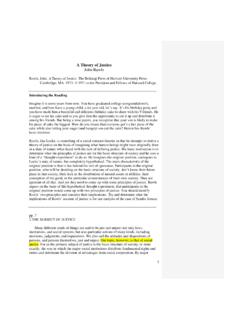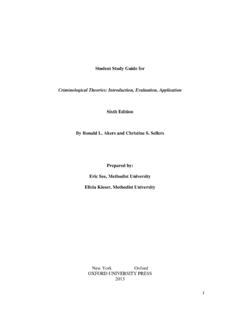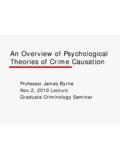Transcription of A THEORY OF JUSTICE - University of Belgrade
1 _j_ A THEORY OF JUSTICE JOHN RAWLS THEBELKNAPPRESSOF HARVARD University PRESS CAMBRIDGE, MASSACHUSETTS Distributive Shares political principle; and so, if it wishes, a well-ordered society can devote a sizable fraction of its resources to expenditures of this kind. But while the claims of culture can be met in this way, the principles of JUSTICE do not permit subsidizing universities and in stitutes, or opera and the theater, on the grounds that these institu tions are intrinsically valuable, and that those who engage in them are to be supported even at some significant expense to others who do not receive compensating benefits. Taxation for these purposes can be justified only as promoting directly or indirectly the social conditions that secure the equal liberties and as advancing in an appropriate way the long-term interests of the least advantaged. This seems to authorize those subsidies the JUSTICE of which is least in dispute, and so in these cases anyway there is no evident need for a principle of perfection.
2 With these remarks I conclude the discussion of how the princi ples of JUSTICE apply to institutions. Clearly there are many further questions that should be considered. Other forms of perfectionism are possible and each problem has been examined only briefly. I should emphasize that my intention is solely to indicate that the contract doctrine may serve well enough as an alternative moral conception. When we check its consequences for institutions, it appears to match our common sense convictions more accurately than its traditional rivals, and to extrapolate to previously unsettled cases in a reasonable way. 332 CHAPTER VI. DUTY AND OBLIGATION In the two preceding chapters I have .discussed the principles of JUSTICE for institutions. I now wish to take up the principles of natural duty and obligation that apply to individuals. The first two sections examine the reasons why these principles would be chosen in the original position and their role in making social cooperation stable.
3 A brief discussion of promising and the principle of fidelity is included. For the most part, however, I shall study the implica tions of these principles for the THEORY of political duty and obliga tion within a constitutional framework. This seems the best way to explain their sense and content for the purposes of a THEORY of jus tice. In particular, an account of the special case of civil disobedi ence is sketched which connects it with the problem of majority rule and the grounds for complying with unjust laws. Civil dis obedience is contrasted with other forms of noncompliance such as conscientious refusal in order to bring out its special role in stabil izing a nearly just democratic regime. 51. THE ARGUMENTS FOR THE PRINCIPLES OF NATURAL DUTY In an earlier chapter( 18-19) I described briefly the principles of natural duty and obligation that apply to individuals. We must now consider why these principles would be chosen in the original position.
4 They are an essential part of a conception of right: they define our institutional ties and how we become bound to one an other. The conception of JUSTICE as fairness is incomplete until these principles have been accounted for. 333 Duty and Obligation From the standpoint of the THEORY of JUSTICE , the most important natural duty is that to support and to further just institutions. This duty has two parts: first, we are to comply with and to do our share in just institutions when they exist and apply to us; and sec ond, we are to assist in the establishment of just arrangements when they do not exist, at least when this can be done with little cost to ourselves. It follows that if the basic structure of society is just, or as just as it is reasonable to expect in the circumstances, everyone has a natural duty to do what is required of him. Each is bound irrespective of his voluntary acts, performative or otherwise.
5 Now our question is why this principle rather than some other would be adopted. As in the case of institutions, there is no way, let us as sume, for the parties to examine all the possible principles that might be proposed. The many possibilities are not clearly defined and among them there may be no best choice. To avoid these dif ficulties I suppose, as before, that the choice is to be made from a short list of traditional and familiar principles. To expedite matters, I shall mention here only the utilitarian alternative for purposes of clarification and contrast, and very much abbreviate the argument. Now the choice of principles for individuals is greatly simplified by the fact that the principles for institutions have already been adopted. The feasible alternatives are straightway narrowed down to those that constitute a coherent conception of duty and obliga tion when taken together with the two principles of This restriction is bound to be particularly important in connection with those principles definitive of our institutional ties.
6 Thus let us suppose that the persons in the original position, having agreed to the two principles of JUSTICE , entertain the choice of the principle of utility (either variant) as the standard for the acts of individuals. Even if there is no contradiction in this supposition, the adoption of the utilitarian principle would lead to an incoherent conception of right. The criteria for institutions and individuals do not fit to gether properly. This is particularly clear in situations in which a person holds a social position regulated by the principles of JUSTICE . For example, consider the case of a citizen deciding how to vote be tween political parties, or the case of a legislator wondering whether to favor a certain statute. The assumption is that these in-1. For clarification on this point I am indebted to Allan Gibbard. 334 51. The Arguments for Natural Duty dividuals are members of a well-ordered society that has adopted the two principles of JUSTICE for institutions and the principle of utility for individuals.
7 How are they to act? As a rational citizen or legislator, a person should, it seems, support that party or favor that statute which best conforms to the two principles of JUSTICE . This means that he should vote accordingly, urge others to do like wise, and so on. The existence of institutions involves certain pat terns of individual conduct in accordance with publicly recognized rules. The principles for institutions have, then, consequences for the acts of persons holding positions in these arrangements. But these persons must also regard their actions as governed by the principle of utility. In this case the rational citizen or legislator should support the party or statute whose victory or enactment is most likely to maximize the net balance (or average) of satisfaction. The choice of the utility principle as the standard for individuals leads to contrary directives. To avoid this conflict it is necessary, at least when the individual holds an institutional position, to choose a principle that matches in some suitable way the two prin ciples of JUSTICE .
8 Only in noninstitutional situations is the utilitarian view compatible with the agreements already made. Although the principle of utility may have a place in certain duly circumscribed contexts, it is already excluded as a general account of duty and obligation. The simplest thing to do, then, is to use the two principles of JUSTICE as a part of the conception of right for individuals. We can define the natural duty of JUSTICE as that to support and to further the arrangements that satisfy these principles; in this way we arrive at a principle that coheres with the criteria for institutions. There is still the question whether the parties in the original position would not do better if they made the requirement to comply with just institutions conditional upon certain vo untary acts on their part, for example, upon their having accepted the benefits of these arrangements, or upon their having promised or otherwise under taken to abide by them.
9 Offhand a principle with this kind of con dition seems more in accordance with the contract idea with its emphasis upon free consent and the protection of liberty. But, in fact, nothing would be gained by this proviso. In view of the lexical ordering of the two principles, the full complement of the equal 335 Duty and Obligation liberties is already guaranteed. No further assurances on this score are necessary. Moreover, there is every reason for the parties to secure the stability of just institutions, and the easiest and most direct way to do this is to accept the requirement to support and to comply with them irrespective of one's voluntary acts. These remarks can be strengthened by recalling our previous dis cussion of public goods ( 42). We noted that in a well-ordered society the public knowledge that citizens generally have an effec tive sense of JUSTICE is a very great social asset.
10 It tends to stabilize just social arrangements. Even when the isolation problem is over come and fair large-scale schemes already exist for producing pub lic goods, there are two sorts of tendencies leading to instability. From a self-interested point of view each person is tempted to shirk doing his share. He benefits from the public good in any case; and even though the marginal social value of his tax dollar is much greater than that of the marginal dollar spent on himself, only a small fraction thereof redounds to his advantage. These tendencies arising from self-interest lead to instability of the first kind. But since even with a sense of JUSTICE men's compliance with a coop erative venture is predicated on the belief that others will do their part, citizens may be tempted to avoid making a contribution when they believe, or with reason suspect, that others are not making theirs.









